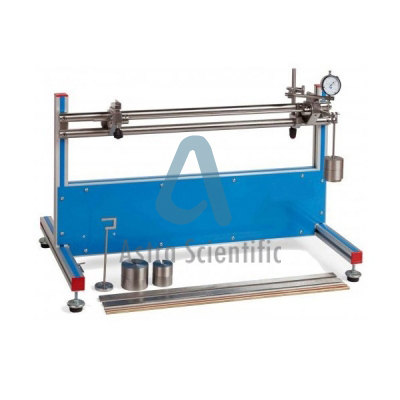Description and Specification for Lab Tenders
Astra Scientific Torsional Vibration Apparatus.
This bench top mounted unit is used to study torsion and torsional
vibration in experiments. The apparatus is constructed around a profiled
aluminium base with leveling feet, onto which is mounted 4 vertical
chuck pillars. Each pillar contains a central shaft running in precision
bearings with a chuck at one end which grips a torsion specimen. Each
chuck also contains a large disc of varying mass and inertia. With these
chucks it is possible to assemble a torsion specimen with up to 3
masses.
Vibrations are transmitted into the torsion specimen by means of an
exciter, which is electronically speed controlled from the main control
unit. To change the end conditions of the apparatus a fifth chuck houses
a chuck which rigidly clamps the end of the torsion specimen to achieve
a fixed end. Also supplied with the apparatus is a manual torsion
arrangement, which allows a known angular twist to be applied to the
specimen. A cord is wrapped around one of the large discs and a load is
applied via a hanger and weights set. The angle of twist for incremental
loading is recorded and the modulus of rigidity can be calculated.
Oscillations sensors are mounted integrally with each mass pillar and
provide signals of the amplitude of vibration. The control unit
conditions these signals and makes them available to an oscilloscope
(not supplied) for vibration analysis.
Unit for investigating torsional vibration and torsional stiffness
Observation of resonance, phase change
To be made from profiled aluminum with levelling feet at each corner
To have steel torsion bar, corrosion-resistant, 1300mm long, Ø6mm with torsional mass discs of Ø150mm and Ø228mm
4 movable chuck pillars with integral bearings, the bearing units can be positioned as required
To have speed-controlled exciter with drive crank
Angular movement of shaft recorded using oscillation sensors
Electronic exciter control unit with digital display
Torsion arrangement for modulus of rigidity experiments

